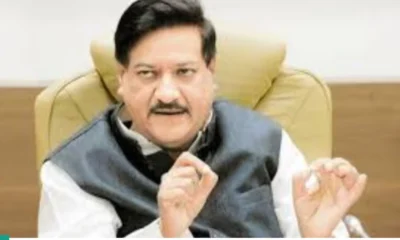[vc_row][vc_column][vc_column_text]Refusing an urgent hearing on a petition challenging the appointment of IPS officer M Nageshwar Rao as interim CBI Director, the Supreme Court today (Wednesday, Jan 16) agreed to hear the matter next week.
As the matter came up, Chief Justice of India Ranjan Gogoi, in an oral mentioning, declined an urgent hearing of the petition filed jointly by the NGO, Common Cause and activist Anjali Bhardwaj. He, however, indicated that the petition may be listed next week.
The petition seeks quashing of the January 10 order of the Appointments Committee of the Cabinet that named Rao as the acting CBI chief for a second time. It contends that the government has “completely bypassed” the statutory requirement to consult the high-powered selection committee of the Prime Minister, Opposition Leader and the Chief Justice of India before appointing the CBI Director.
The plea argues that the procedure laid down in Section 4A of the Delhi Special Police Establishment Act, 1946, amended by the Lokpal and Lokayuktas Act, 2013 should be followed for the appointment of the CBI director.
The petitioners also argued that Rao’s earlier appointment as interim CBI Director following the ouster of Alok Verma on October 23 was quashed by the Supreme Court in a judgment on January 8. Yet the January 10 order has stated that the Appointment Committee of the Cabinet approved the appointment of Rao “as per the earlier arrangement”.
“The October 23 order making Mr. Rao interim CBI Director was quashed by the Supreme Court on January 8 for violating the procedure for appointment of CBI Director as defined in the DSPE Act… However, the government still invoked its earlier order which had been quashed, to once again make Shri Nageshwar Rao Interim Director of the CBI even though it was not the competent authority and did not have any powers to make the appointment,” the petition said.
Lack of transparency in the appointment of the CBI Director allows the government to exercise undue influence in the appointment process especially at the stage of short-listing of candidates, the petition said.
M Nageswara Rao, a 1986-batch Odisha cadre IPS officer, was first appointed as interim chief under dramatic circumstances on October 23, around 2 am, when the then CBI Director Alok Verma was divested of his powers and sent on forced leave.
After the removal of former CBI chief Alok Verma for the second time, this time by the committee headed by Prime Minister Narendra Modi, on January 10 – barely 48 hours after he was reinstated by the Supreme Court – Rao was again named as the interim chief of the agency.
Rao then reversed all decisions taken by Verma, including the order for probe against a secretary in PMO in coal scam, in the previous two days.
Verma was transferred as Director General of Fire Services, Civil Defence and Home Guards, an offer which he refused and subsequently resigned from the Indian Police Services (IPS) instead.
Congress leader Mallikarjun Kharge termed the appointment of Rao as interim chief as ‘illegal’ and in a letter to the PM Modi urged that a meeting of the selection committee should be called immediately to choose a new CBI Director ‘without further delay’.
Kharge had voted against the removal of Verma as the CBI chief and has since asked that the findings of the Central Vigilance Commission (CVC) and Justice AK Patnaik’s report on Verma should be available on public domain so that the people can draw their own conclusions in the matter.[/vc_column_text][/vc_column][/vc_row]


 Latest world news20 hours ago
Latest world news20 hours ago
 Latest world news21 hours ago
Latest world news21 hours ago
 Cricket news21 hours ago
Cricket news21 hours ago
 India News17 hours ago
India News17 hours ago
 India News12 hours ago
India News12 hours ago















